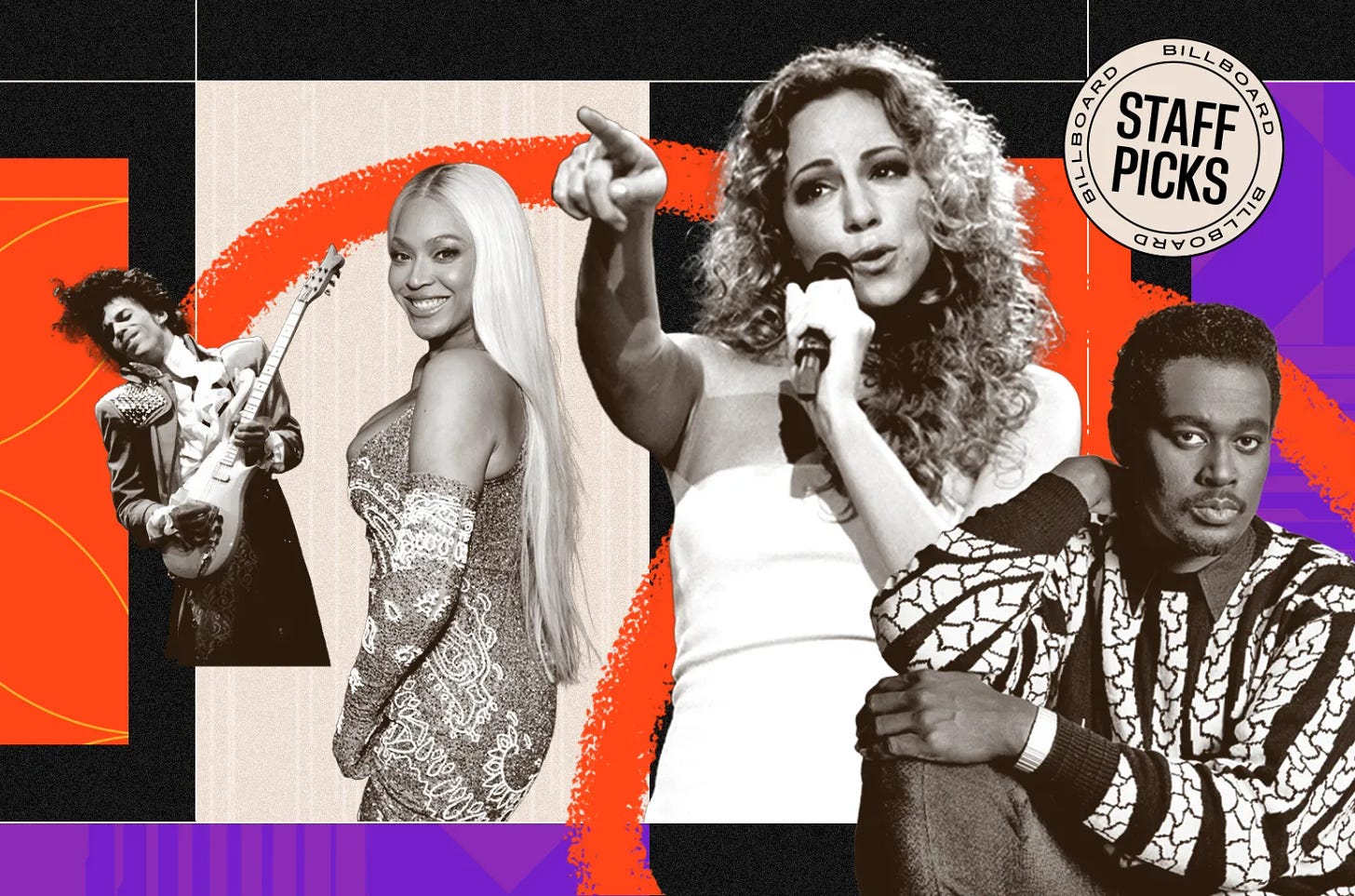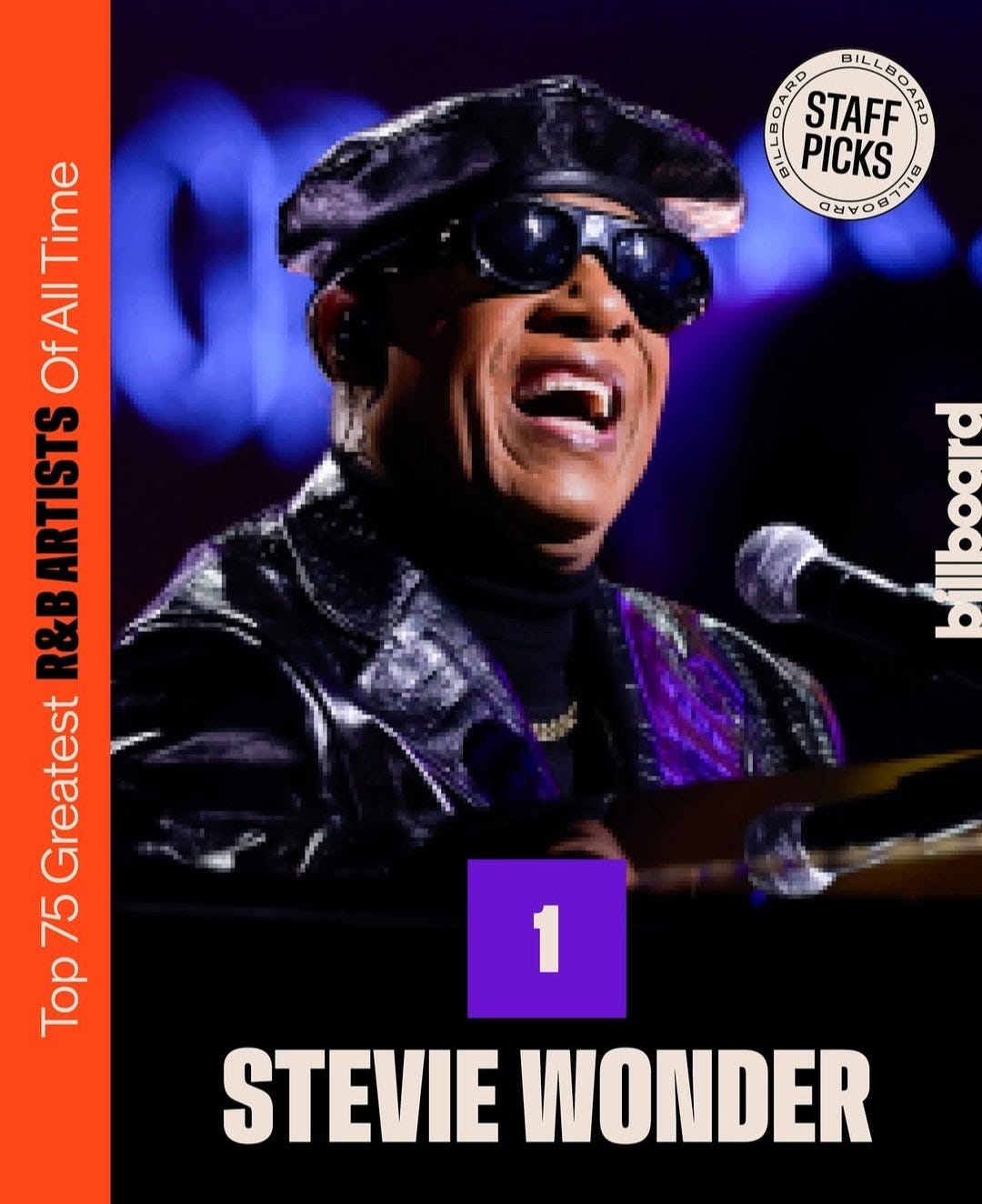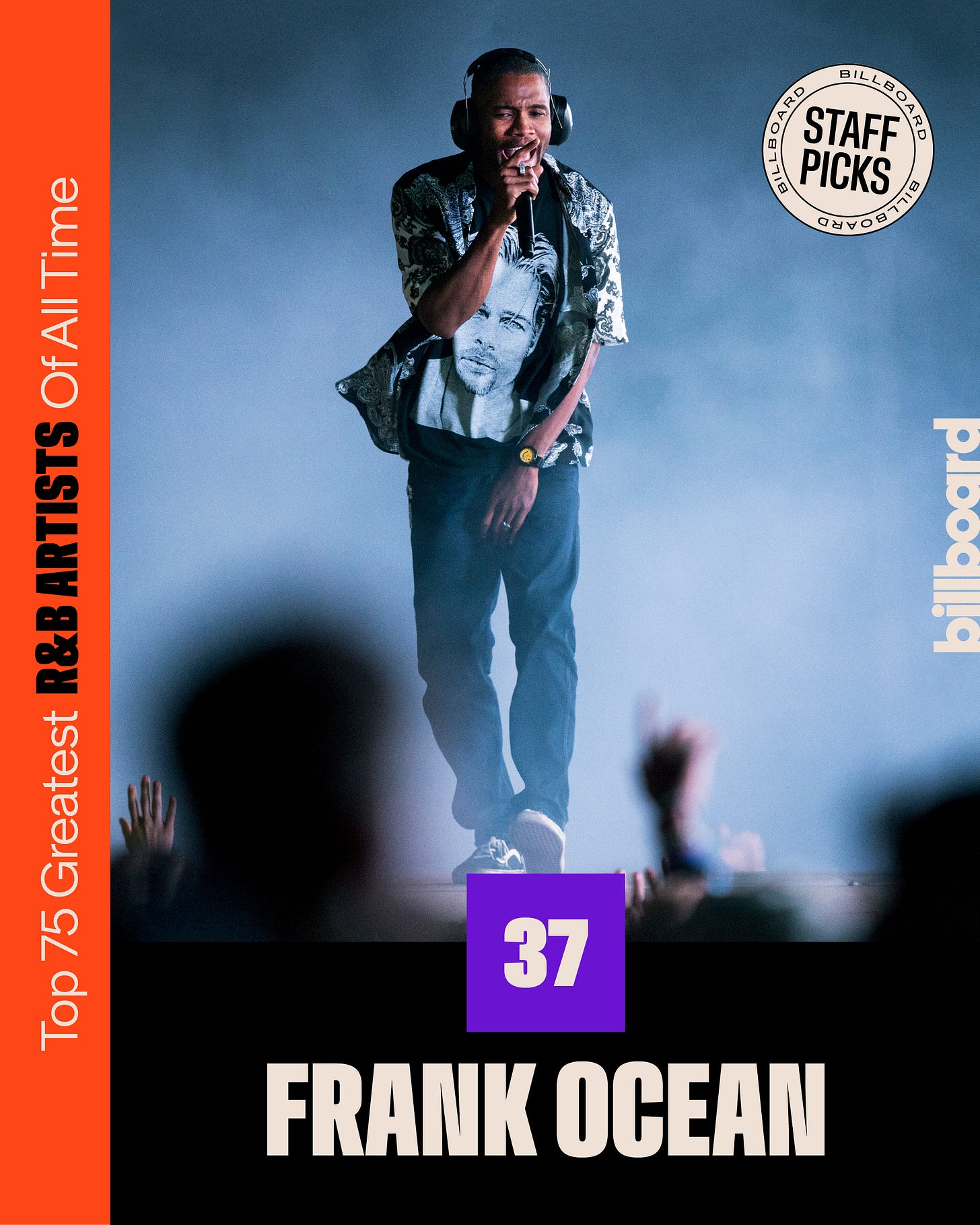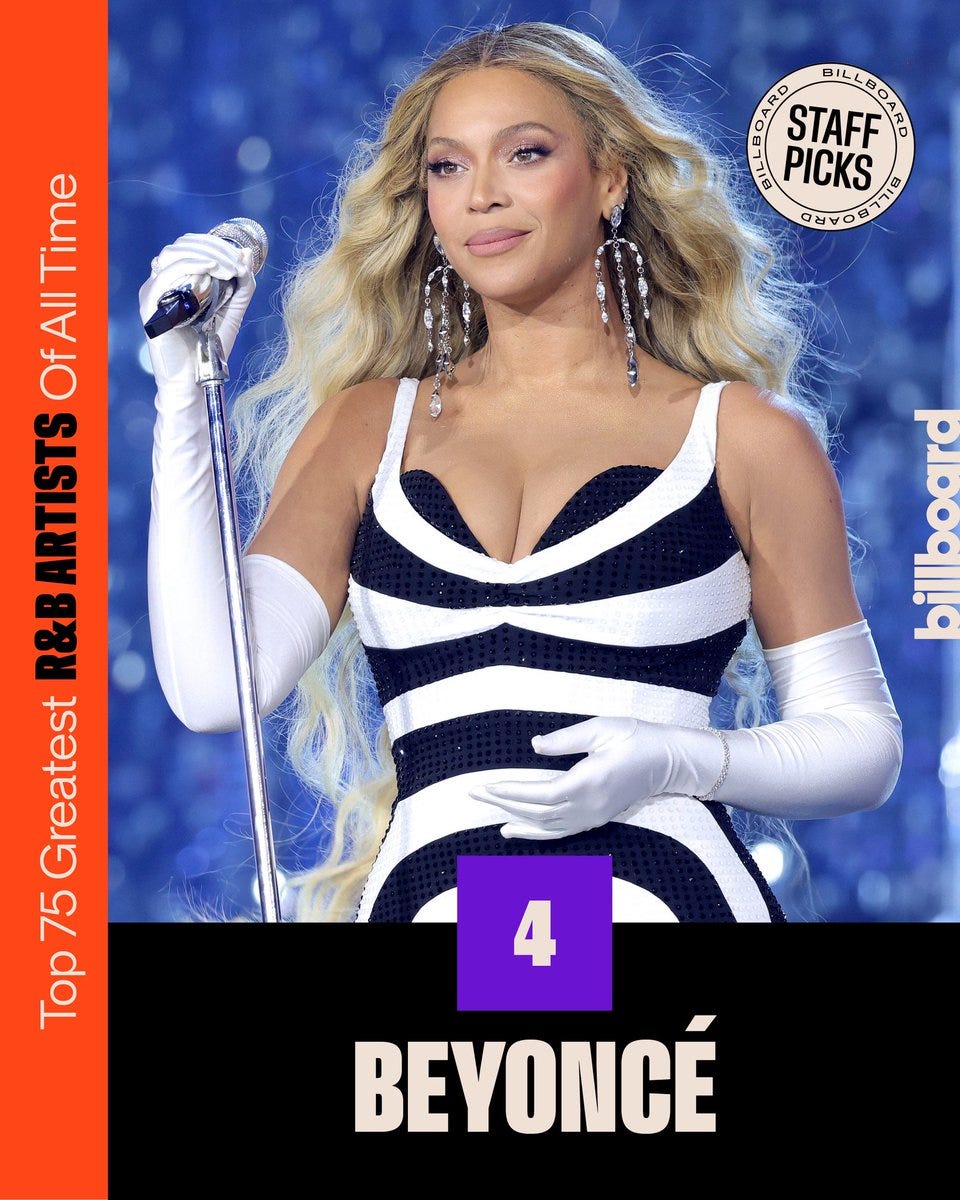Billboard Played In People’s Faces During Black Music Month
No list will ever satisfy everyone, of course. R&B is a sprawling genre spanning many eras and styles, narrowing it down to a ranked 75 is an exercise guaranteed to spark debate.
Full disclosure: We love you, Angel Diaz, Carl Lamarre, Gail Mitchell, Heran Mamo, Janine Coveney, Kyle Denis, Michael Saponara, Trevor Anderson, and William E. Ketchum III. But it needed to be said.
If there’s one thing not to do during Black Music Month, it’s to play in people’s faces about the legacy of Black music. Yet that’s exactly how many R&B lovers felt when Billboard unveiled its “75 Best R&B Artists of All Time” list in the midst of the June celebration. What should have been a tribute to R&B’s rich history instead hit a sour note for fans, artists, and observers alike. The list, presented as staff picks, quickly set social media ablaze with outrage and bafflement. From the jump, the ranking seemed engineered to provoke: beloved legends were ranked surprisingly low (or omitted entirely) while newer artists and pop-crossover stars were given pride of place. So, what did we get? A commentary on R&B greatness that many felt was tone-deaf to the genre’s essence and its community’s sentiments.
The most jarring aspect for many was seeing how R&B’s foundational artists were treated. The top ten included some expected icons, but the order left people scratching their heads. Stevie Wonder at #1 and Aretha Franklin at #2 are hard to argue with; those two are practically the North Star of R&B. But seeing Michael Jackson at #3, followed by Beyoncé (who’s barely R&B today) at #4, raised eyebrows. Beyoncé, a phenomenal entertainer of the last two decades, was somehow ranked above Whitney Houston (#5) and Prince (#7). That alone had folks fuming about how a contemporary artist known as much for pop as R&B could edge out the Purple One or the Voice? And then there was R. Kelly at #9. Yes, R. Kelly’s musical impact on R&B is significant, that (for better or worse) could not be ignored, but considering his now-infamous personal crimes, many found it galling that he’d be exalted in the top ten of an all-time list. Dropping a convicted abuser and pedophile into a celebratory Black Music Month list felt like a slap in the face to most, as if Billboard ignored the cultural context just for the sake of chart stats or past hits.
Beyond the top ten, the placements grew more perplexing. Fans were jaw-dropped at how many R&B titans were left out of the top 10 altogether. Think about it. Luther Vandross, often regarded as one of the greatest male vocalists in R&B history, didn’t even crack the top twenty (Billboard slotted him at a dismal #22). Similarly, soul genius Donny Hathaway landed at #21, just outside the top 20. For devotees of classic R&B, it was unthinkable that Vandross and Hathaway would be ranked so low in favor of newer, more pop-oriented names. These are voices that defined generation: Vandross’s smooth, heartfelt balladry and Hathaway’s gospel-infused soul are the bedrock upon which later artists built. Seeing neither man in the upper echelon felt like a glaring omission of proper respect. “Omission” isn’t even the right word; they’re on the list, but their placement feels like an insult. As one music outlet noted, fans were stunned that names like Vandross (as well as Diana Ross, Janet Jackson, Mary J. Blige, and others) were all outside the top ten on this list. It begs the question: what criteria could possibly justify ranking them lower than they clearly deserve?
Billboard laid out criteria for their staff picks, supposedly factoring in “industry achievements, game-changing influence, enduring generational/cultural impact, vocal prowess, body of work, and career longevity.” On paper, that sounds like a comprehensive way to measure an artist’s greatness. In practice, however, the final ranking often seemed to ignore those very metrics. Take Sam Cooke and Otis Redding, for example. These men are architects of R&B and soul music. Cooke’s mellifluous voice and pioneering soul-pop crossover, as well as Redding’s raw, emotive power, both set the template that hundreds of singers followed. They meet every criterion: massive cultural impact (Cooke’s influence on soul and even the civil rights era; Redding’s posthumous legend), vocal prowess, and enduring legacy. And yet, Billboard’s list places Sam Cooke at #13 and Otis Redding at #20. Those are respectable numbers, but many fans argued that they should have been much higher, in the top 5 or top 10, given that without Cooke or Redding, much of what we call R&B might not sound the same. Ranking Otis Redding behind a slew of more modern performers felt, to many, like the list-makers had a short memory of the genre’s roots.
The disconnect between the stated criteria and the outcomes was most glaring when comparing veteran legends to contemporary stars. According to Billboard, factors such as body of work and career longevity were taken into account; yet, a singer like Usher (#12) outranked Luther Vandross, and Mary J. Blige (#16) edged out icons like Smokey Robinson (#19) and Gladys Knight (#30). There’s no denying Usher and Mary J. are heavyweight names in R&B, but to say they surpass Smokey (Motown legend, with a 60-year career) or Gladys (whose voice powered soul classics for decades) is a bold claim. It’s the kind of ranking that made older R&B aficionados shake their heads. Even Prince at #7, while high, drew complaints because he was placed below artists he directly influenced. And the late great Marvin Gaye squeaked in at #10, behind a controversial pick like R. Kelly, which many viewed as outright disrespect. When a list intended to honor R&B seems to undervalue the very pioneers who built the genre, fans understandably cry foul.
Perhaps the biggest sticking point (the reason people felt “played in the face”) was the inclusion of certain newer artists at the expense of revered veterans. Billboard’s all-time list made room for quite a few 2010s-era performers who are still early in their careers. For instance, alt-R&B darling Frank Ocean showed up at #37, and Gen-Z favorites SZA at #44, H.E.R. at #70, and Summer Walker at #74. On the surface, it’s great to acknowledge younger talent, but R&B is not a static museum piece, after all. But the problem, as countless fans pointed out, is the context, as this is supposed to be the 75 greatest of all time. Ocean, SZA, H.E.R., Summer Walker… they’re all promising or even acclaimed artists, sure. Yet, some of them have only been in the game a few years, with perhaps one or two albums to their name. How do you measure a “career longevity” of five years against someone like, say, India.Arie, Eric Benét, Chanté Moore, Faith Evans, or even Sade, who has been crafting lush soul music since the 1980s? The answer: you don’t, unless your list’s priorities skew toward recency or popularity over true legacy.
And indeed, that’s how it looked to many. Fans on forums and social media were livid that these “newcomers” (as one write-up dubbed them) not only made the cut but in some cases were ranked higher than far more seasoned acts. The inclusion of Summer Walker in particular became a lightning rod. Walker’s two studio albums were well-received in the last few years, but it’s safe to say she hasn’t yet reshaped the genre or amassed a body of work comparable to most names on that list. Placing her at #74, above even a few old-school pioneers like Etta James (#73), felt absurd to those who respect R&B’s history.
In fact, an article covering the fallout noted how readers were “surprised to see newcomers Summer Walker, H.E.R., and SZA” taking up spots that could have gone to more tenured artists. It’s not that anyone hates these young women; they’re all talented, but many felt it was simply too early to anoint them as all-time greats. Meanwhile, some true greats were nowhere to be found. One of the most egregious omissions mentioned by almost everyone: Faith Evans and Sade. Simply put, if you can include certain artists on the list, then Faith should be considered for inclusion. Number two, it’s hard to fathom an R&B pantheon without Sade Adu, whose influence and distinctive sound have been a quiet storm staple for four decades. Yet Sade didn’t make the list at all, a snub so glaring that even pop culture blogs exclaimed “Ouch!” at the oversight. The same goes for ‘90s R&B mainstays like Monica, or neo-soul luminary Angie Stone, each of whom has a catalog and impact that arguably eclipse some of the younger names that did make the cut. Fans of these artists were stunned at the absence of their faves, and they didn’t stay quiet about it.
Across the board, the community sentiment was that Billboard’s list traded genuine homage for hot takes. During Black Music Month, of all times, you might expect a mainstream outlet to pay proper respect to the architects and unsung heroes of R&B. Instead, what people saw was a list that felt skewed toward the modern and commercial. How else to explain why someone like Rihanna shows up at #46 and The Weeknd at #47, even as legends like Jackie Wilson (#72) and Ruth Brown (#75) are barely hanging onto the bottom? It’s not that Rihanna and The Weeknd aren’t hugely successful artists—they absolutely are. But Rihanna, for most of her career, has been a pop star who dabbled in R&B, and The Weeknd has openly evolved into more of an ‘80s pop/synthwave revivalist than an R&B singer in recent years. They are global superstars, yes, but labeling them two of the greatest R&B artists ever, placing them above dozens of artists who dedicated their careers to R&B, struck many as fundamentally misguided. It reads like Billboard wanted the list to appeal to casual pop fans as much as to R&B aficionados, perhaps to drive clicks. But in doing so, they blurred genre lines in a way that hardcore R&B supporters couldn’t abide. One could almost hear the collective groan: “Rihanna and The Weeknd aren’t even R&B anymore, so why are they here?”
The backlash was swift and unambiguous. R&B fans, especially Black audiences who hold this music dear, did not mince words in criticizing the list. Social media threads filled up with passionate debates, with longtime listeners schooling others on the contributions of the artists who appeared to be slighted. On one popular forum, known as Lipstick Alley, a commenter bluntly suggested that some of the newcomers like Summer Walker and H.E.R. “need to be removed from the list” entirely, while insisting that veterans like Bobby Womack deserved much higher positions. Womack, a ‘60s/‘70s soul great who penned and sang classics, was ranked down at #69 in Billboard’s tally. Seeing him dozens of places below, say, Chris Brown (#26) or Alicia Keys (#33) was too much for some to take calmly. Elsewhere, the conversations I had were lamenting that Etta James, the woman who gave us “At Last” and one of the most iconic voices in any genre, was ranked a paltry #73. “How do you do Etta like that?” was a common refrain; a feeling that these architects of R&B were being given token placements instead of true honor.
Even the artists included in the list but ranked lower than expected had their defenders up in arms. Fans of Janet Jackson, for example, argued that placing her at #17 was a travesty given how she helped shape contemporary R&B and pop (hell, Janet literally coined “Rhythm Nation”). Chaka Khan at #27 had people incredulous—Chaka, the vocal blueprint for so many singers, lagging behind performers who likely grew up idolizing her. And the omission of any female groups or many male groups (no Supremes, Isley Brothers, or Temptations, as the list focused on solo artists) meant the list overlooked the contributions of group dynamics to R&B’s evolution. Though that could be a conscious choice, it still didn’t sit well with those who revere those groups. The list’s narrow scope in that sense (solo artists only) wasn’t clearly communicated in the title, adding to confusion and debate.
Let’s not forget the intra-fandom wars the list stirred up, too. Any time rankings are involved, fanbases start comparing notes: Is Beyoncé really a “better” R&B artist than Prince or James Brown as her #4 slot implies? Some argued yes, citing her versatility and cultural impact; others vehemently said no, noting that much of Beyoncé’s output is pop/visual-album spectacle rather than traditional R&B soul. Debates raged over Mariah Carey (#8) vs. Whitney Houston (#5)—two vocal titans with overlapping eras and styles. And then there was the matter of Aaliyah. The influential ‘90s princess of R&B was placed at #40, and her fans were not pleased to see her so mid-pack. To them, Aaliyah’s trendsetting blend of smooth vocals with hip-hop production in the ‘90s changed the course of R&B. Seeing her behind dozens of artists who came in her wake felt like another example of the list missing the plot. In fact, one impassioned commenter argued that Aaliyah should have been in the top ranks because “all her albums are great and shifted the genre,” a sentiment many on Twitter echoed by questioning why newer artists who arguably rode the wave Aaliyah helped create were ranked above her.
The irony of this uproar is that the list was intended as a celebration of the achievements of these individuals. Billboard rolled it out in installments, hyping it as a Black Music Month special project. It even timed the final top ten reveal with Juneteenth, presumably aiming to honor Black musical excellence on a day commemorating Black freedom. But intention and impact are two different things. Instead of uniting fans in tribute, the ranking sowed division and frustration. By prioritizing provocation over propriety, Billboard ended up alienating the very community Black Music Month is meant to uplift. Longtime R&B supporters felt that the magazine’s staff had perhaps pandered to younger readers or chart success, rather than creating a thoughtful homage to the genre’s full legacy. The conversation became less about “let’s celebrate these great artists” and more about “can you believe they disrespected [insert legend] like this?”—which is not what you want when shining a spotlight on Black music history.
No list will ever satisfy everyone, of course. R&B is a sprawling genre spanning many eras and styles, and narrowing it down to a ranked 75 is an exercise guaranteed to spark debate. Fans understand that. But there’s a difference between healthy debate and what many saw as outright dishonor. The latter is what resonated here. To many readers, Billboard’s list felt like it was compiled by a committee that doesn’t truly understand R&B’s lineage, or worse, one that does understand it and chooses to ignore it for clout. The criteria they touted were solid, but when you see the results, you have to wonder if those guidelines were applied unevenly. How else do you explain venerable names like Patti LaBelle (#25), Teddy Pendergrass (#23), or Barry White (#42) taking a backseat to artists with a fraction of their influence or none of their trailblazing firsts? It’s almost as if the compilers wanted to stir the pot by throwing in a bit of everything, where heavy hitters, critical darlings, current chart-toppers, and just enough pioneers to claim credibility, but the balance was off.
By “playing in people’s faces,” Billboard got what any controversy-courting list might seek: attention. But at what cost? Trust, perhaps. The trust of the R&B community that a major music publication would do right by them (supposedly) during their special month. Instead, readers saw a list that, in their view, undercut some of R&B’s most hallowed figures while propping up artists who haven’t yet proven they’ll have an enduring impact. It’s a reminder that cultural context matters. You can’t simply quantify Black music’s legacy by throwing together stars from all eras into one ranking without expecting pushback on the nuances. Especially not when Black audiences, who’ve seen their musical pioneers undervalued before, are watching closely.
In the end, the furor itself speaks volumes about the passion people have for R&B. Fans wouldn’t be this upset if they didn’t deeply care about the genre and its icons. They know that Otis Redding’s soulful roar and Sam Cooke’s velvety croon laid the groundwork for everything that came after. They know Luther Vandross’s satin voice influenced countless singers, and that Sade’s absence is practically criminal. They understand the nuances—like how Frank Ocean’s artistry is brilliant but still young, or how The Weeknd’s evolution has taken him out of the R&B sphere even as he sits on that list. In other words, the community picked apart the list because they value the subject matter so highly. That’s something a celebration of Black music should have tapped into positively, not triggered in a negative way.
So, what’s the takeaway? Perhaps it’s this. R&B is personal to a lot of people. It’s the soundtrack of Black joy, pain, love, and life across generations. When a publication attempts to rank the greats, it had better get it right—or at least be prepared for the fallout. Billboard’s staff picks list might have aimed to spark conversation, but it mostly sparked ire. By playing fast and loose with the definition of “greatest,” it ended up uniting R&B fans in one way, but it didn’t intend for almost everyone to agree that the list overlooked their favorites. In a month meant for honoring Black music’s past, present, and future, the focus sadly shifted to what the list got wrong, rather than what those 75 artists, whatever they might be, have accomplished.
At the close of Black Music Month, the dust has settled, but the discourse remains a cautionary tale. If you’re going to honor Black music legends, do it with the proper reverence. Don’t rank pioneers as footnotes below today’s hot newcomers just to seem trendy. Don’t conflate commercial crossover with genre greatness. And maybe, just maybe, hold off on crowning anyone the “best of all time” until time itself has had a chance to judge. Otherwise, you’ll have a lot of us out here feeling played, and ready to call you out on it, face to face.





